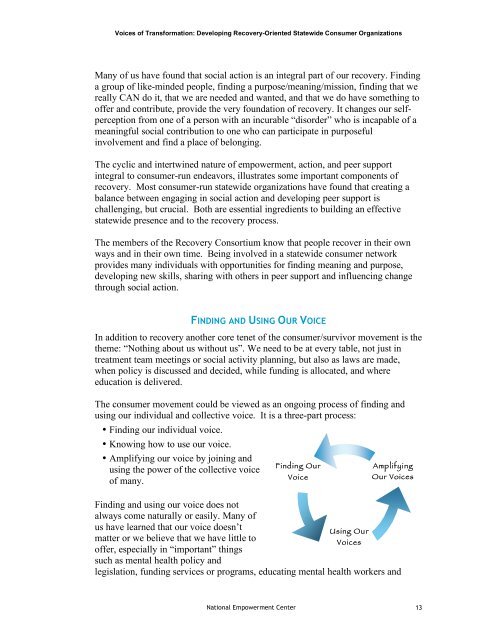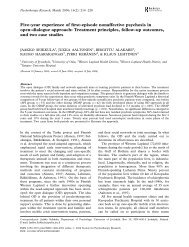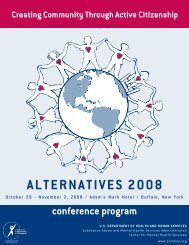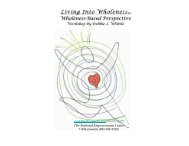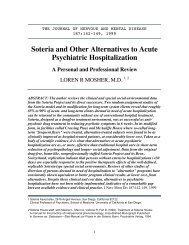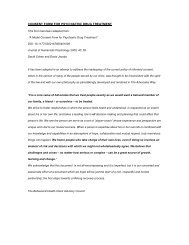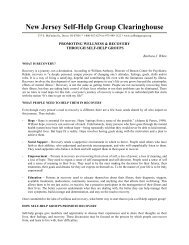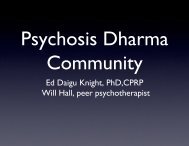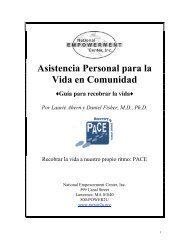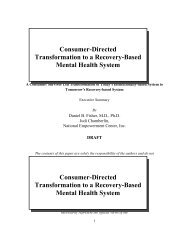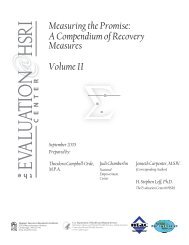Voices of Transformation - National Empowerment Center
Voices of Transformation - National Empowerment Center
Voices of Transformation - National Empowerment Center
You also want an ePaper? Increase the reach of your titles
YUMPU automatically turns print PDFs into web optimized ePapers that Google loves.
<strong>Voices</strong> <strong>of</strong> <strong>Transformation</strong>: Developing Recovery-Oriented Statewide Consumer Organizations<br />
Many <strong>of</strong> us have found that social action is an integral part <strong>of</strong> our recovery. Finding<br />
a group <strong>of</strong> like-minded people, finding a purpose/meaning/mission, finding that we<br />
really CAN do it, that we are needed and wanted, and that we do have something to<br />
<strong>of</strong>fer and contribute, provide the very foundation <strong>of</strong> recovery. It changes our selfperception<br />
from one <strong>of</strong> a person with an incurable “disorder” who is incapable <strong>of</strong> a<br />
meaningful social contribution to one who can participate in purposeful<br />
involvement and find a place <strong>of</strong> belonging.<br />
The cyclic and intertwined nature <strong>of</strong> empowerment, action, and peer support<br />
integral to consumer-run endeavors, illustrates some important components <strong>of</strong><br />
recovery. Most consumer-run statewide organizations have found that creating a<br />
balance between engaging in social action and developing peer support is<br />
challenging, but crucial. Both are essential ingredients to building an effective<br />
statewide presence and to the recovery process.<br />
The members <strong>of</strong> the Recovery Consortium know that people recover in their own<br />
ways and in their own time. Being involved in a statewide consumer network<br />
provides many individuals with opportunities for finding meaning and purpose,<br />
developing new skills, sharing with others in peer support and influencing change<br />
through social action.<br />
FINDING AND USING OUR VOICE<br />
In addition to recovery another core tenet <strong>of</strong> the consumer/survivor movement is the<br />
theme: “Nothing about us without us”. We need to be at every table, not just in<br />
treatment team meetings or social activity planning, but also as laws are made,<br />
when policy is discussed and decided, while funding is allocated, and where<br />
education is delivered.<br />
The consumer movement could be viewed as an ongoing process <strong>of</strong> finding and<br />
using our individual and collective voice. It is a three-part process:<br />
• Finding our individual voice.<br />
• Knowing how to use our voice.<br />
• Amplifying our voice by joining and<br />
using the power <strong>of</strong> the collective voice<br />
<strong>of</strong> many.<br />
Finding Our<br />
Voice<br />
Amp lifyi ng<br />
Our <strong>Voices</strong><br />
Finding and using our voice does not<br />
always come naturally or easily. Many <strong>of</strong><br />
us have learned that our voice doesn’t<br />
Using Ou r<br />
matter or we believe that we have little to<br />
<strong>Voices</strong><br />
<strong>of</strong>fer, especially in “important” things<br />
such as mental health policy and<br />
legislation, funding services or programs, educating mental health workers and<br />
<strong>National</strong> <strong>Empowerment</strong> <strong>Center</strong> 13


